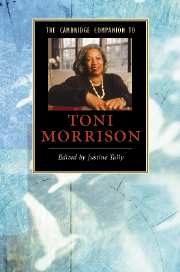Book contents
- Frontmatter
- Introduction: “All necks are on the line”
- Part I Toni Morrison’s fiction
- Part II Toni Morrison’s criticism and editing
- Part III Essays
- 11 Language and narrative technique in Toni Morrison’s novels
- 12 Toni Morrison, intellectual
- 13 Morrison and the critical community
- Part IV Further Reading
- Index
13 - Morrison and the critical community
from Part III - Essays
Published online by Cambridge University Press: 28 January 2008
- Frontmatter
- Introduction: “All necks are on the line”
- Part I Toni Morrison’s fiction
- Part II Toni Morrison’s criticism and editing
- Part III Essays
- 11 Language and narrative technique in Toni Morrison’s novels
- 12 Toni Morrison, intellectual
- 13 Morrison and the critical community
- Part IV Further Reading
- Index
Summary
As Toni Morrison established her place within the American literary canon, her writing has been for the most part well received both by critics writing for popular culture and those writing for academe. The numerous accolades and awards honoring Morrison for her literature testify to her importance as one of the most prolific and talented writers of the twentieth and twenty-first centuries. Critical responses to Morrison's work focus on her audience, stylistic technique, and major themes, and explore the role she plays as a precursor to new voices in American literature, especially African American women's literature, given her instrumental influence in the Black Women Writers' Renaissance in the last decades of the twentieth century and as a book editor. The critical response is also informed by the critics' need to categorize Morrison as a black woman writer, African American writer, American writer, woman writer, and critic.
Whether in fiction or non-fiction, Morrison focuses her writing on a variety of topics including the intersections of race, class, and gender, questions of home and place, the connection between the individual and the community, self-definition, and the importance of cultural, familial, and individual history or rememory, and connections between, and nurturing roles of, African American folk culture and black cultural beliefs across the diaspora. Throughout her work, the author examines a number of themes including justice, love, power, death, and betrayal.
- Type
- Chapter
- Information
- The Cambridge Companion to Toni Morrison , pp. 175 - 184Publisher: Cambridge University PressPrint publication year: 2007
- 1
- Cited by

